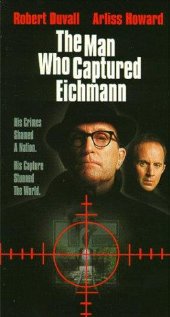| The Man Who Captured Eichmann | |
|---|---|
 Film poster | |
| Based on | Eichmann in My Hands by |
| Written by | Lionel Chetwynd |
| Directed by | William Graham |
| Starring | |
| Composer | Laurence Rosenthal |
| Country of origin | United States |
| Original language | English |
| Production | |
| Executive producers |
|
| Producer | Raúl Outeda |
| Production locations | Buenos Aires, Argentina |
| Cinematography | Robert Steadman |
| Editor | Drake Silliman |
| Running time | 96 minutes |
| Production companies |
|
| Original release | |
| Network | TNT |
| Release | November 10, 1996 |
The Man Who Captured Eichmann is a 1996 American historical drama television film directed by William Graham and written by Lionel Chetwynd, based on the 1990 book Eichmann in My Hands by Peter Malkin and Harry Stein. The film stars Robert Duvall as Nazi war criminal Adolf Eichmann, who lived under the name Ricardo Klement in Buenos Aires, Argentina, and Arliss Howard as Israeli Mossad agent Peter Malkin, who captured Eichmann in 1960.
Contents
The Man Who Captured Eichmann premiered on TNT on November 10, 1996. [1] [2] [3] [4] The film received positive reviews from critics, with Duvall being nominated for a Primetime Emmy Award and a Screen Actors Guild Award for his performance.